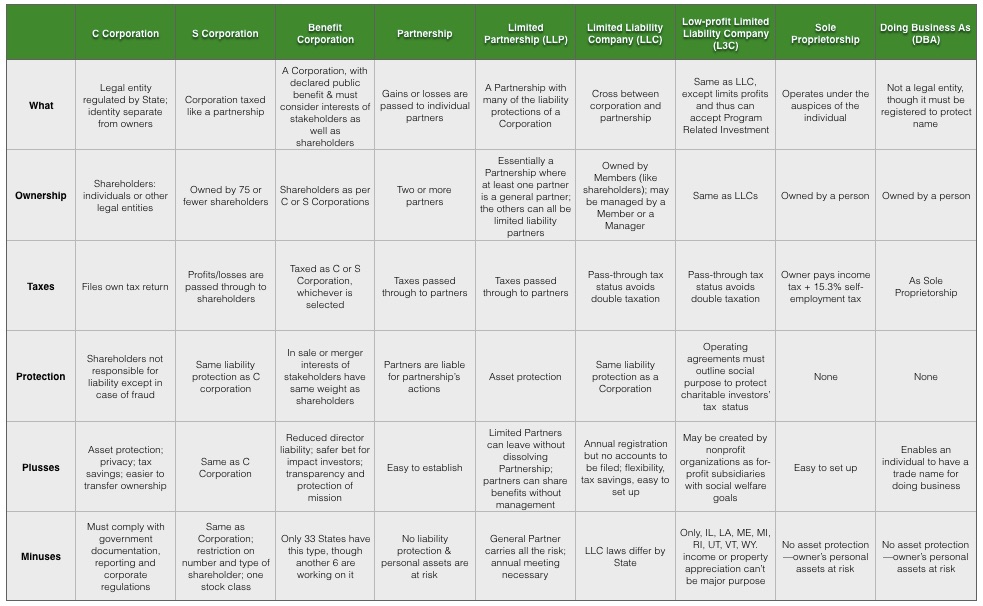Startup Registration Decision Making Table to Decide the Right Legal Form for Your Venture
Startup Registration: As soon as your startup is ready to go, you will need to register the business legally. The main types of legal structure for businesses, or business entity types, are shown in the table, but there are a few variants, such as the Social Purpose Corp in CA, or the Public Benefit Corporation in CO. Check the latest status with your Secretary of State’s office in your own State.
The L3C hybrid business entity type can attract private and philanthropic capital (so-called ‘program related investment’ or PRI from a 501c3 or government grant) to enable a socially beneficial objective. Among business entity types, the L3C has a charitable mission as a primary objective, while at the same time it is free to distribute the profits to its members. Several other hybrid entity forms are being created, such as back-to-back for profit and nonprofit entities. Private Operating Foundations, a seldom used formula, can have for-profit subsidiaries.
Vermont has a very successful one in the Windham Foundation, that operates the Grafton Inn and Grafton Village Cheese. The private operating foundation is a model that may prove to have an exciting future for social enterprises. Vermont is also among only a handful of states in which you can create and operate your business digitally—without a physical presence within the State. This is called a digital, or virtual, company.
In any case, you should discuss the right startup registration options with the office of the Secretary of State in the State where you’ll be operating. In my experience staff members are very willing to guide you towards the best solution to meet your purpose, in many cases avoiding the expensive recourse to using an attorney. Good advice can be found about the process at The US Chamber of Commerce.
Startup Registration: Table of Business Entity Types

Feel free to copy, download, and print the table for reference.
Notes:
- Business structure legislation is evolving to meet changing aspirations and expectations, State by State. It is important to check current legislation in your State. For example, since the publication of the chart above, North Carolina has adopted L3C legislation.
- Even with current legislation, the development of stakeholder capitalism has resulted in significant behavioral changes within the different structures to reflect evolving social demands. Hence within Corporations, social purpose can impact priorities and strategies in such a way that the nature of business is radically altered.
- The very rapid growth of the B Corporation, where companies are independently certified against strict standards, defining social, environmental, and governance best practices (different to the legal structure of the Benefit Corporation). By 2023, there were over 3,000 public benefit corporations in the USA, including names like Danone, Unilever, and Campbell Soup. There are nearly 8,000 BCorps certified world-wide in 2023.
- The demands of the UN’s 2030 Agenda for Sustainable Development seeks to strengthen the social, economic and environmental dimensions of sustainable development, both have a spill over on corporate strategy and operations.
New Approaches to Business Legal Structures
You need to choose the right business legal structure for startup registration. It covers the rules for conducting business and will both protect you from personal liability while also offering legal and tax benefits, despite somewhat constraining your freedom of action. However, there is an The Emerging Fourth Sector—the concept was originally recognized by the Aspen Institute in its 2009 report. This essentially is about the overlapping and converging of the three traditional sectors of for profit, non-profit and government, as each seeks to make our world better meet people’s needs.
What I have observed more recently is that the startup registration situation has become even more complex. Some founders, for example, create new arrangements that best suit their own purpose, using different forms in combination and an application of IRS rules to suit their own needs. So, for example, as Non-Profits struggle with traditional forms of fund-raising, they go to the limit of the IRS rules on how much trading they may do, in the form of mission-related business activities. So, have a look at how founders are changing the rules of business.
Other people in the commercial sector operating what are commonly called social enterprises, seek to deliver social benefit using commercial models. There are hundreds of examples, such as Better World Books, Newman’s Own, or Tom’s Shoes.
There are other creative examples, such as Prosperity Candle, set up by Ted Barber. He established a new and innovative model for helping lift women and families out of poverty, through two aligned organizations – a social enterprise and a nonprofit – that work together to solve a problem and deliver sustainable impact: disadvantaged women in war-tern countries.
Co-ops and ESOPs
Worker-owned co-ops and employee-owned businesses (ESOPs) are more established models that do not exactly fit the mainstream business model, though they do require business registration. The Coop Development Institute has very good guidance of the differences between the two. Both, of course need to be registered with the State. Founders of startups that don’t scale to IPO size can use Co-ops and ESOPs as an exit strategy, when the time comes to retire or move on.
You need to be very convinced about the purpose of your venture to decide which way to go in terms of the startup registration type that you choose. If there is no established structure that suits you, don’t be afraid to find or create an innovative one that will! This should be normal thinking for innovative founder founders of purpose-driven startups.
Social and Political Expectations Evolve Relentlessly
We are living in a far from static business world. Purpose driven business is becoming very prevalent, especially for the startup community. Notwithstanding the world’s current instability, even major corporations are altering priorities in favor of meeting changing social demands. The UN Sustainable Development Goals, for example and more and more frequently used as a benchmark against which to asses corporate priorities.
community. Notwithstanding the world’s current instability, even major corporations are altering priorities in favor of meeting changing social demands. The UN Sustainable Development Goals, for example and more and more frequently used as a benchmark against which to asses corporate priorities.
The UN Global Compact, has advice for business leaders on how to approach the alteration of strategic ambition. The most recent evaluation (2021) shows relatively small percentages of change, but considered on the global scale, they are nonetheless substantial.
The creation of a stakeholder strategy may not have an immediate impact on the choice of an appropriate business entity for you startup, not have an existing business change its legal status, but the paramount role of shareholder capitalism is relentlessly changing in favor of a more balanced stakeholder focus. This is one of the reasons why there is progressive change and that a significant majority of US States have Benefit Corporation legislation and most others are working on new legislation.





